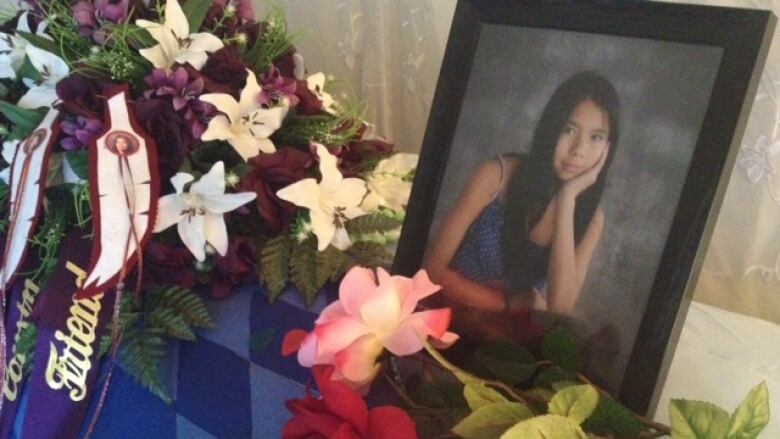Reporter notebook: CBC's Jillian Taylor reflects on Tina Fontaine

How does a 15-year-old girl end up dead in the river?That question haunts me. I think about Tina Fontaine every day.Sadly, she is not the only one.
I have been a journalist for seven years. My whole career has been dedicated to covering missing and murdered indigenous women.I was 22 when Jennifer Catcheway disappeared. She was 18.Claudette Osborne, Cherise Houle and Hillary Angel Wilson followed more names that haunt me.
- Tina Fontaine, 15, found in bag in Red River
- OpinionIt takes a village: Reaching out to First Nations homeless
- Tina Fontaine's family facing first Christmas without teen
They haunt me because their cases remain unsolved. So much mystery and pain surround them. Every year, there is another vigil to mark their disappearances or deaths.Its atto the point for me that every time a girl is reported missing I try to find her on social media.
I did that for Tina Fontaine.
Something felt different with Tina's case. I felt compelled to reach out to her family and check in with them. I didnt know them. At that time, she was still a missing person. I found her aunt Robyn.
The next day police announced Tina's body was found.
Treated as a person
I wasn't even working that day, but I rushed home from whatever errands I was running, just to watch the livestream of the police press conference.It was heartbreaking.
The head of the homicide unit, detective sergeant John O'Donovan, spoke to the media. This never happens. Hewas shaken,emotional, and above all, sincere.
Shes definitely been exploited and taken advantage of and murdered and put into the river in this condition, said ODonovan.
He used the words 'child', 'girl', and even called her a 'petite thing.' He humanized a victim like I have never seen before.
Shes a child. This is a child thats been murdered.I think society, we would be horrified if we found a litter of kittens or pups in this condition. This is a child. Society should be horrified, said ODonovan.
And society was horrified. Hundreds, if not thousands of people showed up at Winnipeg's Alexander Docks for her vigil.
Again, there was something different about this case. There was collective outrage. There was also collective love.Usually I just see the aboriginal community at vigils. This one had people of all cultural backgrounds, ages, and neighbourhoods from across the city.
I believe Tinas death was atipping point. I think people knew about the issue of missing and murdered indigenous women,but didn't know how to relate.
As a victim, Tinawas humanized by the police, media, and her family, like never before.There was no victim blaming in this situation. She was exploited. We know that. But it wasnt her fault.
Invited in
Her familywent above and beyond to give media access to Tinas life.
Thelma Favel is a loving maternalfigure who reached out for help and was failed. She was failed by a system she has dedicated her life to, fostering kids for more than 30 years.
It's the access Thelma gave us that also blows me away. She invited me, a reporter, to the funeral. She invited me to the grave site. She was hurting so much, but was so kind.
The thing that touched me the most was Thelma invited me to offer tobacco to Tinas spirit while the sacred fire was burning. I felt honoured and humbled. So oftenreportersswoop in and out of peoples lives,especially when there is tragedy. Its awful. I always feel like I am cheating the family of something. But Thelma was just happy that people were telling her baby girls story.
I'm not saying that other families of missing and murdered women aren't like this, I'm just talking about Tina's story right now.At the end of the day, I hope how Tina was treated in death, is how we, as a society, will treat all missing and murdered indigenous women going forward.
I, as a reporter will never get sick of hearing families say: 'She wasa sister, a mother, a friend, a cousin. She wasloved.'
Lets remember that when inevitably another indigenous woman goes missing or is murdered.












_(720p).jpg)


 OFFICIAL HD MUSIC VIDEO.jpg)
.jpg)



























































































